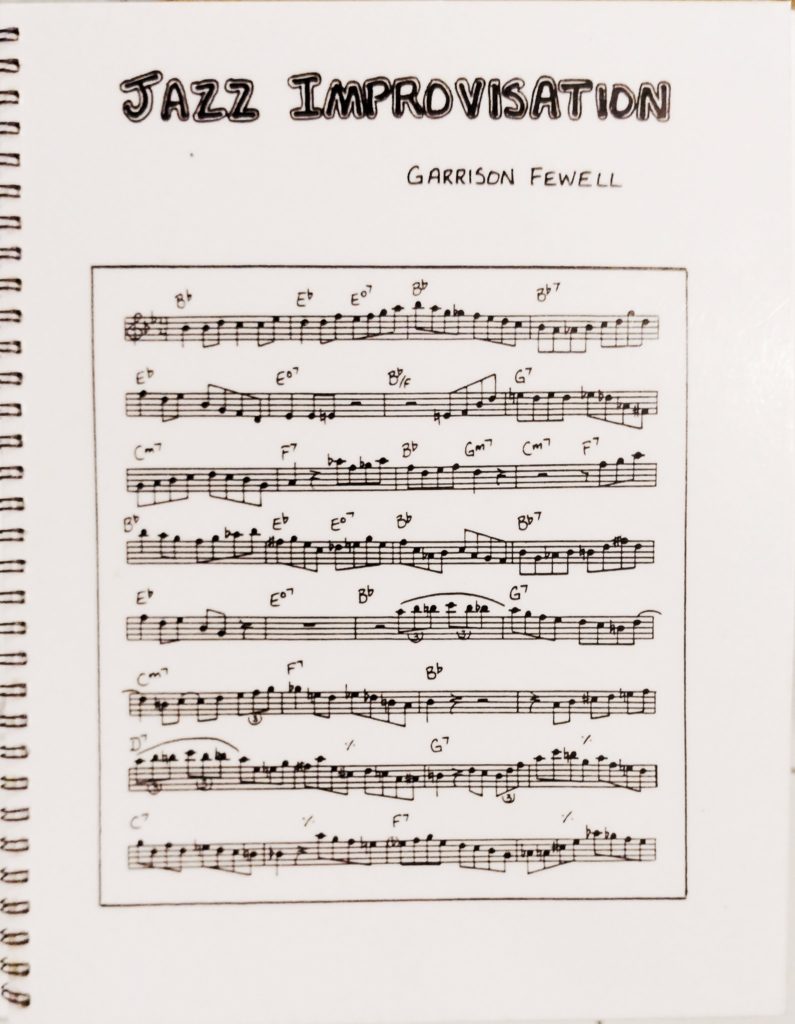
It was January 2015. I was a student at Berklee College of Music, my first semester. I just moved from Kuala Lumpur, Malaysia to Boston, Massachusetts, USA. My very first jazz guitar teacher when I was in Berklee was Garrison Fewell. The first song he assigned to me was Billy Strayhorn’s Chelsea Bridge. During that same semester, he also assigned me ‘Round Midnight and Body and Soul. All harmonically challenging ballads! Looking back at all that, I realised he REALLY challenged me out of my comfort zone.
It wasn’t my first encounter with Garrison’s teaching material though. My teacher in Kuala Lumpur, Encik Rosdan Abbas (who also studied with Garrison) used excerpts of Garrison’s book as our class material. This book, simply titled Jazz Improvisation was first released in 1984 and was followed by a revised edition in 1986. Since then, Garrison released 2 other books on Berklee Press.
This 77-page book is beautifully presented in old school “Real Book” handwritten text. It’s divided into 28 topics which begins with Major and Minor II-Vs and ends on an exploration of the blues within a jazz context. The book has a wealth of II-V-I lines, etudes, walking bass line etudes, diminished lines and all sorts of jazz guitar goodness. Unlike typical books with scalar approaches, Garrison taught with a focus on learning jazz lines. When he introduced fingerings, it was all practical performer based fingering. Everything was deliberate and gave just enough for an aspiring jazzer to use (and even that was A LOT to digest).
The best part about the books is that ALL the musical examples sound great & very idiomatic. That means that these are all worth practicing. I know I’ve gotten a lot of mileage from the licks over the years. Even now, I still come back to the book to learn more ideas.
Garrison has a very systematic approach to teaching the material. It’s all done from the perspective of a performer who has spent time digesting the knowledge of the players before him. By working on the book, it has helped me see the fretboard in a clearer manner, often opening up different fingering possibilities that I didn’t see before.
The only thing that makes me kind of sad is that since Garrison passed away in 2015, this book has now been out of print. It was a self published work that had only a few copies left. I first bought my copy from Garrison when I was a student of his in 2005 and later I bought a second copy via mail order in 2012. Still, I feel very fortunate to be able to still learn from his work even after all these years. For that, I am very grateful.
If you ever find a used copy of this book, buy it on sight. It’s one of my favorite jazz guitar books ever. Also, if you’re unable to get this one, get the other two Berklee Press books he released. They do in fact expand on ideas from this book, although in a different way.
In conclusion, this is a great book & since there are VERY FEW mentions of it on the Internet except on a Jazz Guitar Online forum thread.
Pros: Amazing lines and musical examples throughout, very well thought out.
Cons: None.
TLDR: If you want to have some really great jazz guitar practice material & you can find a copy of this book, definitely get it.
This book is currently out of print. However, you can get Garrison’s later books on Berklee Press here (Amazon links, not affiliate links)
Jazz Improvisation for Guitar: A Melodic Approach
Jazz Improvisation for Guitar: A Harmonic Approach
[Review Archive]
I wrote a lot of other book, course and video reviews too.
Check out the rest here:
[Read more reviews]
[Submissions for Review Consideration]
- Are you an author who wrote a jazz, guitar or music book?
- Have you created a DVD or an online video course or subscription based website?
- Would you like me to review your book/course?
Please send me a message at azsamad2 at gmail.com with:
For courses: a link to the course/video/product + access info etc.
For books: a link to the book (Dropbox) or PDF attachment (if it’s small) for review consideration.
Depending on whether I dig the book/course, I’ll let you know if I do plan to review it!
I cannot guarantee a review for every submission & if I’m not too into it, I may opt not to review it. I mean, it’s better to get a good review that for me to write a bad review just because it’s not a match for the kind of stuff I dig right? :p
NOTE: All reviews reflect my honest personal opinion so be aware that I will point out both cool Pros and Cons that I see in the work. You dig? 🙂